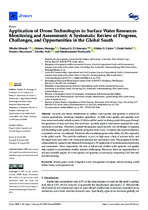Application of drone technologies in surface water resources monitoring and assessment: A systematic review of progress, challenges, and opportunities in the global south

View/
Date
2021Author
Sibanda, Mbulisi
Mutanga, Onisimo
Chimonyo, Vimbayi G. P.
Metadata
Show full item recordAbstract
Accurate and timely information on surface water quality and quantity is critical for
various applications, including irrigation agriculture. In-field water quality and quantity data
from unmanned aerial vehicle systems (UAVs) could be useful in closing spatial data gaps through
the generation of near-real-time, fine resolution, spatially explicit information required for water
resources accounting. This study assessed the progress, opportunities, and challenges in mapping
and modelling water quality and quantity using data from UAVs. To achieve this research objective,
a systematic review was adopted. The results show modest progress in the utility of UAVs, especially
in the global south. This could be attributed, in part, to high costs, a lack of relevant skills, and
the regulations associated with drone procurement and operational costs. The progress is further
compounded by a general lack of research focusing on UAV application in water resources monitoring
and assessment. More importantly, the lack of robust and reliable water quantity and quality
data needed to parameterise models remains challenging. However, there are opportunities to
advance scientific inquiry for water quality and quantity accounting by integrating UAV data and
machine learning.
